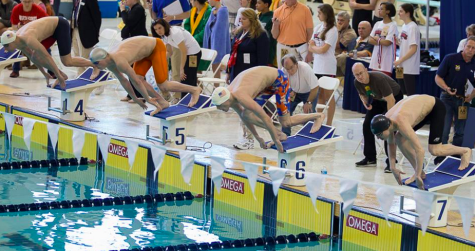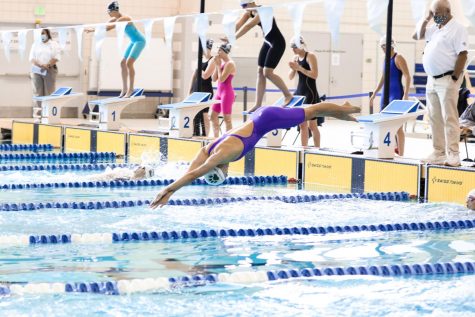Westminster swimmers work towards success year-round
If you’ve ever wondered why the swim team at Westminster is so successful, the answer is very simple. It is because Westminster swimmers work hard and not just during the season. Many Varsity swimmers compete year-round with their respective club teams.
The amount of time these swimmers put into the sport depends on the intensity of their training. However, most of them swim 5-6 days per week for anywhere between 2.5 hours to 4.5 hours per day including dry lands and weightlifting. A year-round swimmer’s training involves morning practices, when they swim for 1-2 hours, and then afternoon sessions when they swim 2-3 more hours. The average Westminster student may get out of bed at 7:00 a.m., but swimmers have to get up at 5:00 a.m. or earlier to go to morning practice, with no chance to hit the snooze button in the hopes of getting a few more minutes of sleep. Another area that is important for swimmers is management of food intake.
“I definitely take in more calories than the average human being,” said senior Varsity swim team captain Patrick Leonard.
Katie Christy, another senior captain of the Varsity swim team, concurs.
“I am not on a diet, but I do try and watch what I eat,” said Christy. “I have to take in many more calories than the average girl, and maybe even the average female athlete because swimming has such high intensity. I probably eat double the amount that most of my friends at school eat.”
In light of this, another commonly mentioned topic among year-round swimmers is the importance of consuming large amounts of protein and carbs. Swimming burns a relatively large number of calories, and it increases swimmers’ appetites significantly. Michael Phelps consumes 12,000 calories per day, six times the amount of an average person.
Weightlifting and dry land workouts are other key factors which contribute to the success of a year-round swimmer. The standard amount of time spent on lifting is two days per week (please clarify, do you mean they lift on two days in a week?).
“I lift anywhere from 30-80 pounds depending on the exercise,” said Christy. “We use dumbbells, no bench-pressing or things like that because it’s easier to injure your shoulders or chest as a swimmer. Sometimes less weight gives better results.”
Leonard agrees with the importance of weightlifting as part of a swimmers’ daily training.
“We do weights as part of dry land two times a week and it’s usually 8-10 reps of low weight to work on having very energetic and quick movements,” said Leonard.
One swimmer’s particular training method is by no means tailored for all swimmers. For example, some year-round swimmers do not lift at all.
“Never,” said junior swimmer Isabelle Bellot-McGrath. “I lift sometimes for Westminster swimming but never for year-round.”
Shaving is another important practice in the life of a year-round swimmer.
“I shave all year round,” said Bellot-McGrath. “Most guys shave for certain meets, because, yes, it helps you swim faster. There’s a term called ‘shaved and tapered’ which you do if a meet is really important and you have to cut time off. Tapering is when your practices leading up to the meet get gradually less intense so your body can be rested before it. Swimmers always joke about not being able to walk places or exercise during taper.”
Shaving also has important mental benefits.
“Shaving helps take off those hundredths of seconds in races, which seems so small but can matter a lot when you are trying to go a certain time,” said Christy. “Shaving is also mental; you know that you have lost drag and the psychological part kicks in as you get ready for a big meet.”
Swimming year-round does not simply mean training year-round. These swimmers practice as hard as they do because they are competing on a regular basis in all seasons.
“I get about a week or two off every August, and a couple days at Christmas and a day or two at Easter,” said Christy. “Other than that, I am training and competing every day, except Sundays, unless there’s a swim meet!”
Waking up at 5:00 AM, swimming and lifting for 4.5 hours per day, having to constantly watch what you eat, and shaving constantly may not be for everyone. Here is insight into why these swimmers adhere to this strict regime.
“I’ve been swimming all my life and I love to be in the water because it provides a challenge no other sport can give, but also because, just like many other sports, achieving a goal is such an incredible feeling,” said Leonard.
Other swimmers came to realize the benefits of this workout only after significant mental and physical barriers were overcome.
“I was forced into the sport when I was about six years old because of my older sister,” said Christy. “I hated it for years but now, I love it. Sometimes the training and meets are tiring, and having to get up at 4:30 A.M. for practice, but my teammates and my coach make it all worth it. Not going to lie, though, it sucks when you can’t go on vacation, have to miss school events or hanging out with your friends because of practice or not being able to stay out late because of that early morning practice. That’s something I still struggle with.”
Swimming in the vigorous way these talented athletes do comes with a lot of personal rewards.
“Swimming year-round is competitive and tedious and scary, but also really rewarding,” said Bellot-McGrath, “It takes extreme amounts of consistency, hard work, and attention to technique and detail. And, often even with these things, even the best swimmers plateau and can’t take mere milliseconds off their times. It’s about your times and your progression and your challenges and your goals.”
Christy, although sometimes disenchanted with swimming’s constant demands and restrictions, truly loves the sport and views it as a wonderful experience.
“Honestly, there’s not really anything that I would change,” said Christy. “I love my teammates, my coaches, and the friendships I have at Dynamo. My teammates are my family, and even when swimming gets tough, we’re all in it together. Swimming teaches you so many essential skills for school, work, and life in general- persistence, patience, determination, hard work ethic, discipline, mental toughness, and so many other things. It may take up my entire life, but it has also shaped who I am as a person in great ways.”








